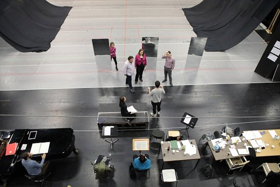LES VEPRES SICILIENNES Premieres at Bayerische Staatsoper

Verdi's grand opéra Les Vêpres siciliennes will be conducted by Omer Meir Wellber, who, following Mefistofele (2015) and Andrea Chénier (2017), will now command his third Staatsoper première. Antú Romero Nunes, who audiences will already know from his interpretation of Rossini's Guillaume Tell (2014, Munich Opera Festival), returns to Munich for this première.
With "The Sicilian Vespers", a piece not performed for almost 50 years now returns to the Bayerische Staatsoper. With that production in 1969 the opera was performed in Italian. Now, for the first time, the Bayerische Staatsoper presents the French version. Written during Verdi's middle period, Les Vêpres siciliennes is one of the most adventurous dramas of his œuvre, and ranks among the pre-eminent Paris operas of the 1850s. This is manifested, for example, in the formally innovative duets in which Verdi comes to the fore as a master of psychological differentiation and compositional nuance. "On the stage it goes to and fro like a tennis match, and the story progresses constantly. (...) Unfortunately it is not performed very often, because the roles are so difficult to cast. But it is simply wonderful music," says Erwin Schrott, who sings his first première at the Bayerische Staatsoper as Procida.
Les Vêpres siciliennes is set amid the French occupation of Sicily. The historical event of the Sicilian uprising of 1282 is freely interpreted in the opera. Director Antú Romero Nunes sees the piece as an experimental setting of what people are capable of doing. Giuseppe Verdi depicted a society dominated by betrayal and oppression. Oppression is found on two levels here: On the first the Sicilian people are oppressed by the French occupiers. On the second the women are oppressed by the belligerent world of the men. The women serve only to manifest male power. It is a bleak world, where it is difficult to find loyalty and allies. "It's thrilling to see what happens between these characters. The most perverse and impossible things happen within entirely archaic family relations. There are no trade-offs here, there is only: 'who oppresses who', and reconciliation remains the realm of Utopia," explains Antú Romero Nunes.
Tenor Bryan Hymel (2014 in Guillaume Tell as Arnold) sings the role of Henri. Young singer Rachel Willis-Sørensen makes her house début as Hélène. George Petean also sings as Guy de Montfort and Erwin Schrott performs the role of Procida.
Comments
Videos

